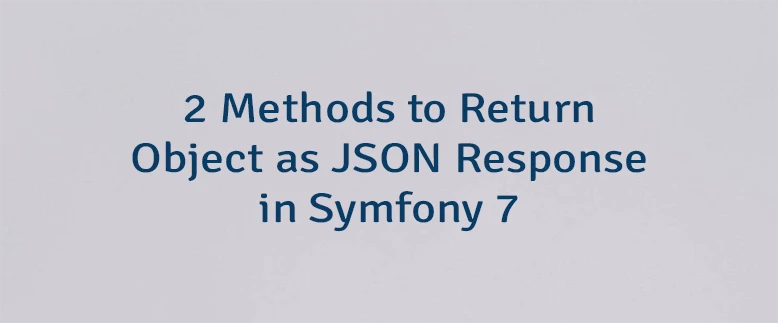JSON is a widely used data format for implementing APIs. Symfony framework provides the JsonResponse class which enables to represent an HTTP response in JSON format. However, this class works with array.
This tutorial provides example how to return object as JSON response in Symfony 7 application.
Let's say we have the User class which should be returned as JSON response:
src/Entity/User.php
<?php
namespace App\Entity;
class User
{
private string $name;
private int $age;
public function getName(): string { return $this->name; }
public function setName(string $name): void { $this->name = $name; }
public function getAge(): int { return $this->age; }
public function setAge(int $age): void { $this->age = $age; }
}Method 1 - Custom factory class
We implemented a new class which allows to create HTTP response from a given object. Serializer component is used to convert object to JSON format. Response is created with corresponding Content-Type header. HTTP status code and additional headers can be provided as well.
src/Factory/JsonResponseFactory.php
<?php
namespace App\Factory;
use Symfony\Component\HttpFoundation\Response;
use Symfony\Component\Serializer\Encoder\JsonEncoder;
use Symfony\Component\Serializer\SerializerInterface;
class JsonResponseFactory
{
public function __construct(private SerializerInterface $serializer)
{
}
public function create(object $data, int $status = 200, array $headers = []): Response
{
return new Response(
$this->serializer->serialize($data, JsonEncoder::FORMAT),
$status,
array_merge($headers, ['Content-Type' => 'application/json;charset=UTF-8'])
);
}
}We can use a new class in controller as follows:
src/Controller/TestController.php
<?php
namespace App\Controller;
use App\Entity\User;
use App\Factory\JsonResponseFactory;
use Symfony\Component\HttpFoundation\Response;
use Symfony\Component\Routing\Attribute\Route;
class TestController
{
public function __construct(private JsonResponseFactory $jsonResponseFactory)
{
}
#[Route('/')]
public function index(): Response
{
$user = new User();
$user->setName('John');
$user->setAge(25);
return $this->jsonResponseFactory->create($user);
}
}The response which will be returned to client:
{"name":"John","age":25}Method 2 - Abstract controller
If controller already extends AbstractController provided by Symfony and no need additional features, the json method in an abstract class can be used to return an object as JSON response.
src/Controller/TestController.php
<?php
namespace App\Controller;
use App\Entity\User;
use Symfony\Bundle\FrameworkBundle\Controller\AbstractController;
use Symfony\Component\HttpFoundation\Response;
use Symfony\Component\Routing\Attribute\Route;
class TestController extends AbstractController
{
#[Route('/')]
public function index(): Response
{
$user = new User();
$user->setName('John');
$user->setAge(25);
return $this->json(
$user,
headers: ['Content-Type' => 'application/json;charset=UTF-8']
);
}
}



The 2 Comments Found
If you have your controller extend
Symfony\Bundle\FrameworkBundle\Controller\AbstractControlleryou could have simply usedreturn $this->json($user);Hi,
Thanks for your suggestion, I added example in a post.
Leave a Comment
Cancel reply